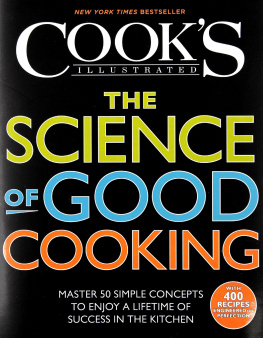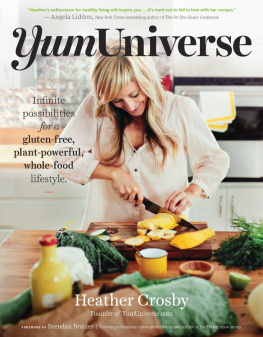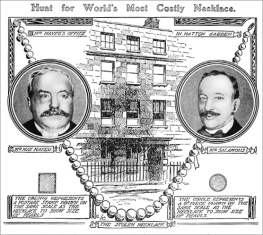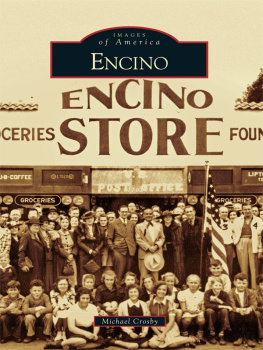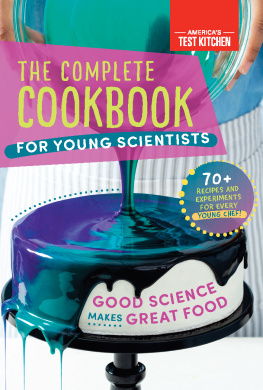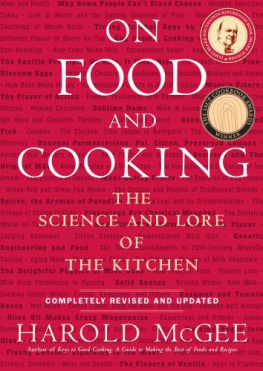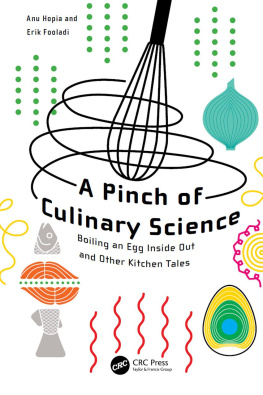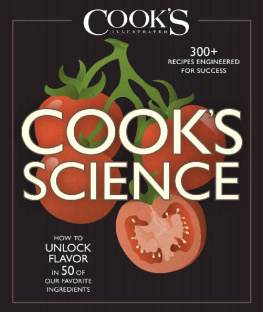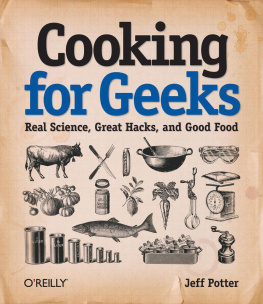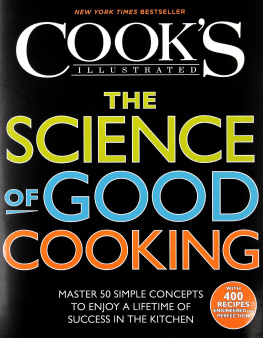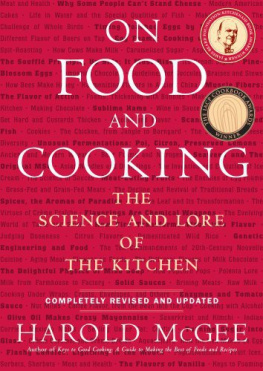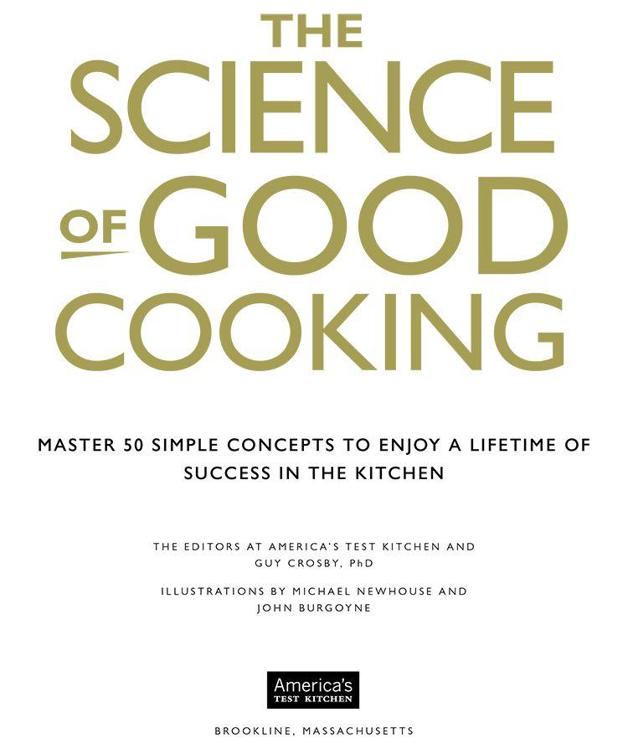
Copyright 2012 by the Editors at Americas Test Kitchen
All rights reserved. No part of this book may be reproduced or transmitted in any manner whatsoever without written permission from the publisher, except in the case of brief quotations embodied in critical articles or reviews.
Americas Test Kitchen
17 Station Street, Brookline, MA 02445
Library of Congress Cataloging-in-Publication Data
The science of good cooking : master 50 simple concepts to enjoy a lifetime of success in the kitchen/ the editors at Americas Test Kitchen and Guy Crosby ; illustrations by Michael Newhouse and John Burgoyne.
p. cm.
Includes index.
Kindle ISBN: 978-1-936493-45-6
1. Cooking. 2. Food. I. Crosby, Guy. II. Americas Test Kitchen (Firm)
TX651.S375 2012
641.3--dc23
2012012807
Hardcover: $40 US
Manufactured in the United States of America
10 9 8 7 6 5 4 3 2 1
Distributed by Americas Test Kitchen
17 Station Street, Brookline, MA 02445
EDITORIAL DIRECTOR: Jack Bishop
SCIENCE EDITOR : Guy Crosby, PhD
PROJECT EDITOR : Molly Birnbaum
TEST KITCHEN EXPERIMENT EDITOR : Dan Souza
DESIGN DIRECTOR : Amy Klee
ART DIRECTOR : Greg Galvan
ASSOCIATE ART DIRECTORS : Erica Lee, Matthew Warnick
DESIGNERS : Taylor Argenzio, Sarah Horwitch Dailey
COLOR ILLUSTRATIONS : Michael Newhouse
BLACK-AND-WHITE ILLUSTRATIONS : John Burgoyne
PHOTOGRAPHY : Daniel J. Van Ackere
PRODUCTION DIRECTOR : Guy Rochford
SENIOR PRODUCTION MANAGER : Jessica Quirk
SENIOR PROJECT MANAGER : Alice Carpenter
PROJECT MANAGER : Kate Hux
ASSET AND WORKFLOW MANAGER : Andrew Mannone
PRODUCTION AND IMAGING SPECIALIST : Lauren Pettapiece
COPY EDITOR : Cheryl Redmond
PROOFREADER : Barbara Wood
SCIENCE PROOFREADER : Joanne Curran-Celentano, PhD
INDEXER : Elizabeth Parson
CONTENTS
By Christopher Kimball
CONCEPT 1:
CONCEPT 2:
CONCEPT 3:
CONCEPT 4:
CONCEPT 5:
CONCEPT 6:
CONCEPT 7:
CONCEPT 8:
CONCEPT 9:
CONCEPT 10:
CONCEPT 11:
CONCEPT 12:
CONCEPT 13:
CONCEPT 14:
CONCEPT 15:
CONCEPT 16:
CONCEPT 17:
CONCEPT 18:
CONCEPT 19:
CONCEPT 20:
CONCEPT 21:
CONCEPT 22:
CONCEPT 23:
CONCEPT 24:
CONCEPT 25:
CONCEPT 26:
CONCEPT 27:
CONCEPT 28:
CONCEPT 29:
CONCEPT 30:
CONCEPT 31:
CONCEPT 32:
CONCEPT 33:
CONCEPT 34:
CONCEPT 35:
CONCEPT 36:
CONCEPT 37:
CONCEPT 38:
CONCEPT 39:
CONCEPT 40:
CONCEPT 41:
CONCEPT 42:
CONCEPT 43:
CONCEPT 44:
CONCEPT 45:
CONCEPT 46:
CONCEPT 47:
CONCEPT 48:
CONCEPT 49:
CONCEPT 50:
PREFACE
Despite the saying about the cat, curiosity is what sets humans apart from other mammals. A hundred years ago, most cooks were working with a limited repertoire of recipes and ingredients, and they had plenty of first-hand experience to make those recipes work. Now we stand at the beginning of a new century, many of us keenly interested in the culinary arts, but without the years of practical experience that it takes to become a great cook.
Whats the solution to this modern quandary? The answer reminds me a bit of my favorite physicist, Lawrence Krauss, who spends his time pondering the mysteries of the universe. In order to understand the cosmos and our place in it, he says, one has to ask how and why. Once the questions have been asked, we can conceive of experiments to prove or disprove our theorems.
All of that sounds rather familiar to everyone who works at Americas Test Kitchen. We start every day by asking questions. Do bones add flavor to meat during cooking? What causes ice cream to turn icy in the freezer? Then we construct kitchen experiments to answer those questions in a manner that helps us, as home cooks, to produce more foolproof recipes, and better food.
To test our theory about the benefits of adding small pieces of frozen butter to eggs, we put 2-pound fishing weights on top of omelets. (The more tender omelet could not hold the weight.) To gauge the benefits of letting cooked meat rest, we sliced one roast as soon as it came out of the oven and measured 10 tablespoons of lost liquid; when we waited just 10 minutes to slice a second roast, the liquid lost was reduced to just 4 tablespoons. And does mixing method really matter when making brownies? We tested stirring gently (with some streaks of flour remaining), then stirred a second batch until all streaks were incorporated, and then finished with a third batch that was well mixed in a standing mixer. The brownies made with the lightest touch were perfect; the others were unpleasantly tough.
All of this is fun and interesting, but our real goal is to make you a better home cook. Understanding the difference between amylose and amylopectin (two types of starches) is of little use to cooks unless this information can be used to produce better mashed potatoes. (It can and does.) And understanding how heat is transferred from the outside of a roast to the inside is useful since it explains why a low oven is best when cooking large pieces of meat. (The outside wont overcook by the time the inside is done.)
This reminds me, of course, of the story of the Vermont storekeeper who was asked if he would have a particularly popular item back in stock before long.
Nope, the old-timer replied.
Why not? the customer wanted to know.
Moves too darn fast!
That inexplicable logic is often like the science of cooking. At first it doesnt seem to make much sense but then, after a bit of thought, things come into focus. When you understand the language of science, cooking becomes clearer and you naturally make better choices in the kitchen. The next time you make pie dough, you might naturally replace half of the water with vodka. (It makes a more pliable dough that bakes up flaky.) Or you will know to brine beans or macerate sliced fruit.
Please enjoy this book. You will find the answers to most of your cooking questions, especially when it comes to whythe most important question of all.
Christopher Kimball
Founder and Publisher
Americas Test Kitchen
WELCOME TO AMERICAS TEST KITCHEN
This book has been tested, written, and edited by the folks at Americas Test Kitchen, a very real 2,500-square-foot kitchen located just outside of Boston. It is the home of Cooks Illustrated magazine and Cooks Country magazine and is the Monday-through-Friday destination for more than three dozen test cooks, editors, food scientists, tasters, and cookware specialists. Our mission is to test recipes over and over again until we understand how and why they work and until we arrive at the best version.
We start the process of testing a recipe with a complete lack of conviction, which means that we accept no claim, no theory, no technique, and no recipe at face value. We simply assemble as many variations as possible, test a half-dozen of the most promising, and taste the results blind. We then construct our own hybrid recipe and continue to test it, varying ingredients, techniques, and cooking times until we reach a consensus. The result, we hope, is the best version of a particular recipe, but we realize that only you can be the final judge of our success (or failure). As we like to say in the test kitchen, We make the mistakes, so you dont have to.
All of this would not be possible without a belief that good cooking, much like good music, is indeed based on a foundation of objective technique. Some people like spicy foods and others dont, but there is a right way to saut, there is a best way to cook a pot roast, and there are measurable scientific principles involved in producing perfectly beaten, stable egg whites. This is our ultimate goal: to investigate the fundamental principles of cooking so that you become a better cook. It is as simple as that.
Next page
